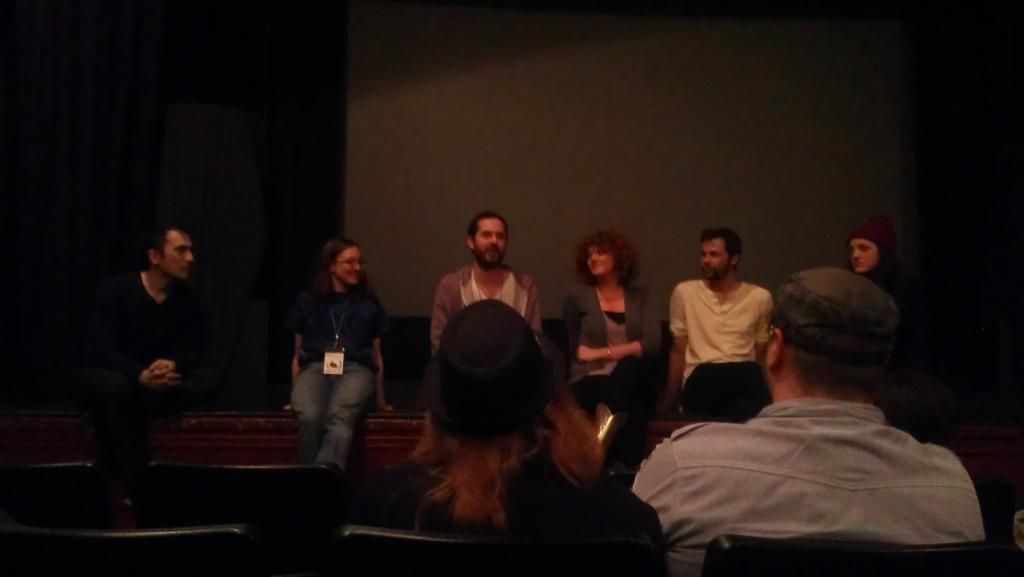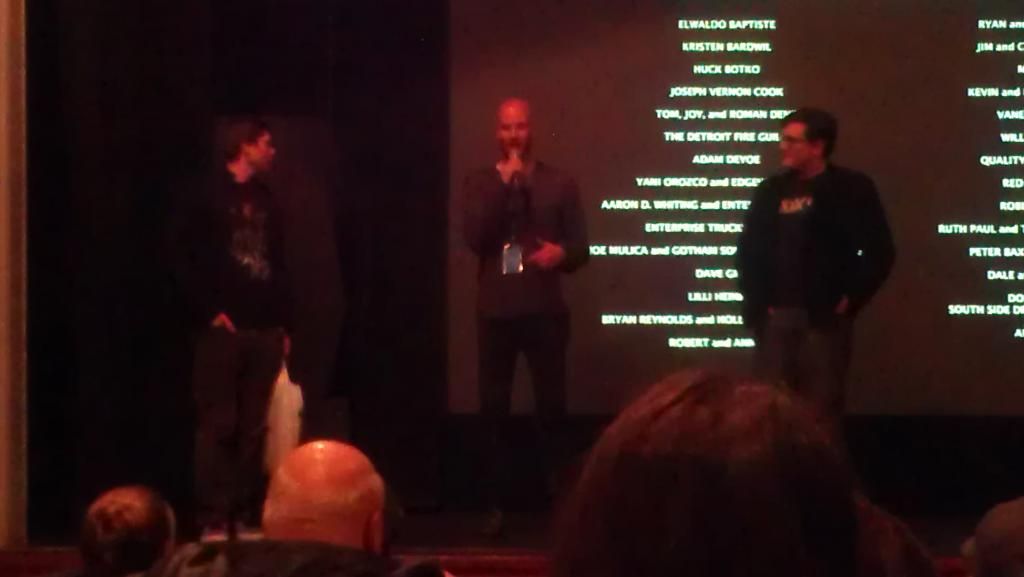BUFF sets its programming unusually tightly - the schedule often only allows for fifteen minutes between the end of one movie and another, so when you factor in Q&A, it's not unusual for things to run over, which means that See You Next Tuesday starting at 8pm was unusually late, but not impossibly so.

Still, sometimes the way it's handled can tick you off. That's Drew Tobia, director of See You Next Tuesday in the middle of the photo above (star Eleanore Pienta is on the right, and I only know the name of Melodie Sisk on the immediate right of Tobia because she was introduced for another movie), and he apparently spent about twenty minutes trying to get the presentation of his movie just right while the audience was standing out in the cold, and didn't seem terribly apologetic about that or how doing so might have a domino effect on the other movies on the schedule. Maybe I"m wrong about that, but between how he yelled out that his movie's title was a play on "cunt" after festival director Kevin Monahan commented on his previous short film's vulgar names... Well, for all the times when it's great to hear people talk with enthusiasm about their movies, sometimes a guy just rubs one the wrong way, and he did for me this time. Probably more me than him, but it didn't help that I was not very fond of his movie, either.

I wasn't able to get nearly as good a picture of the Jug Face crew, unfortunately. That's producer Andrew Van Den Houten, director Chad Crawford Kinkle, and Kevin Monahan hosting the Q&A. They didn't wind up with nearly so much time as the See You Next Tuesday folks, but also didn't have quite so much to get through - they talked about how the face jugs were a real thing in the south and part of the inspiration, but most of the other mythology was invented from whole cloth. There's not really a whole lot to discuss with this movie, as it doesn't go the ambiguous route and is pretty well-done but still kind of rough. I liked it, but as I saw in the review, might have liked it more if there was nothing supernatural about it.
See You Next Tuesday
* * ¼ (out of four)
Seen 29 March 2013 in the Brattle Theatre (Boston Underground Film Festival, digital)
There's a guy on a mailing list I subscribe to who tends to judge movies in large part based on how much he agrees with how the characters act. I suspect most of us do so a little more than we'd like, and See You Next Tuesday certainly had me doing it: I hated watching this movie a little more every time a character did something stupid and self-destructive, which means that by the end I'd worked up some good anger. On reflection, some of that reflects a well-executed presentation of imperfect characters, although I don't know if that gets me from disliking this movie to actual positive feelings.
The movie is mostly the story of Mona (Eleanore Pienta), who is fairly upbeat despite reasons not to be: Most of the other employees at the neighborhood market where she works pick on her, she's in her third trimester but the father of the baby is so absent as to not be worth mentioning, and her best friend is her mother May (Dana Eskelson), a recovering alcoholic who leans on Mona for support and hasn't spoken to her other daughter Jordan (Molly Plunk) in a few years. She seems to be doing okay, considering all that, but she's actually just a couple steps away from falling to pieces.
Even if the movie can be frustrating in a number of other ways, it's at least got an impressive turn by Eleanore Pienta at its center. Mona enters the screen fully formed, working-class but not showing that via the usual ignorance or combative nature, instead tending toward a sort of worn persevering nature. She's pretty easy to like rather than judge, and as the movie goes on and Mona goes into a downward spiral, Pienta does a fine job of conveying the character's desperation to keep from falling down completely. It's easy enough to remember why one liked her in the beginning when she's being somewhat alienating toward the end, and not everyone can manage that.
Full review on eFilmCritic.
Jug Face
* * * (out of four)
Seen 29 March 2013 in the Brattle Theatre (Boston Underground Film Festival, digital)
Jug Face is the sort of horror movie that I often have trouble with, where any hint of supernatural activity actually seems somewhat deflating, as there's plenty of real-world unpleasantness at work. It's done well enough to overcome that much of the time, in part because its mythology is at least original.
There is, it says, a community out in the Tennessee backwoods whose residents worship at a pit of what looks like blood - which, of course, demands regular sacrifices. That's where Ada (Lauren Ashley Carte) has grown up, but now she's in trouble, betrothed to an unexciting neighbor by her parents (Larry Fessenden & Sean Young) but quite possibly pregnant from her brother Jessaby (Daniel Manche). That blind artisan Dawai (Sean Bridgers) has made a jug with her likeness, generally taken as a sign of who should be fed to the pit next.
So which is scarier - a pit that contains a demonic presence which will kill whoever is nearest when not given its tribute, or a reasonably intelligent young woman surrounded by people who think that a hole in the ground demands human sacrifices? There's not necessarily a right or wrong answer to this question, but it is kind of tricky to make both work at once, as the one tends to lessen the impact of the other more often than it reinforces the pair. That's less of the case here than usual, as writer/director Chad Crawford Kinkle builds the earthly situation steadily before adding the paranormal elements to it in a similar slow burn, introducing new bits without often stopping to explain, so that the situation with the pit often feels part and parcel with the isolation as opposed to two different things going on.
Full review on eFilmCritic.
The Rambler
* * * (out of four)
Seen 29 March 2013 in the Brattle Theatre (Boston Underground Film Festival, digital)
Much of the time, a movie that was expanded from a short will feel bloated and kind of boring, as though the striking idea behind the original work has been watered down and made bigger without gaining more detail (last year's BUFF selection Excision struck me that way). For The Rambler, that may be a plus - could a twelve-minute film really capture the vastness and leisurely pace of the title characters rambling the way that this movie does?
The rambler of the title (Dermot Mulroney) is a quiet man with a way with horses who has just been released from prison to an obnoxious wife (Natasha Lyonne) and a miserable job in a pawn shop. Fortunately, there is another option - a job on his brother's horse farm in the northwest. Not starting out with much, if any, cash, he opts to walk and hitchhike, encountering a girl (Lindsay Pulsipher) and an inventor who claims he can record dreams (James Cady) among others. The further he gets down the road, the more surreal his adventures become.
At times, things become downright fantastical. Things don't get quite strange enough for the genre to take a full right turn into sci-fi, horror, or the like, but it's enough to push our conception of what writer/director Calvin Reeder is getting at. We're never really told what this man was in prison for, but there are enough hints through repeated encounters of various natures to work the basics out, although that's not those scenes' only purpose; even as they're only vaguely implying what happened, they're also saying that it's something he can't escape in his mind. The very strangeness of some events suggests that after four years behind bars, he doesn't fit in the world - or at least, doesn't think he does.
Full review on eFilmCritic.
No comments:
Post a Comment